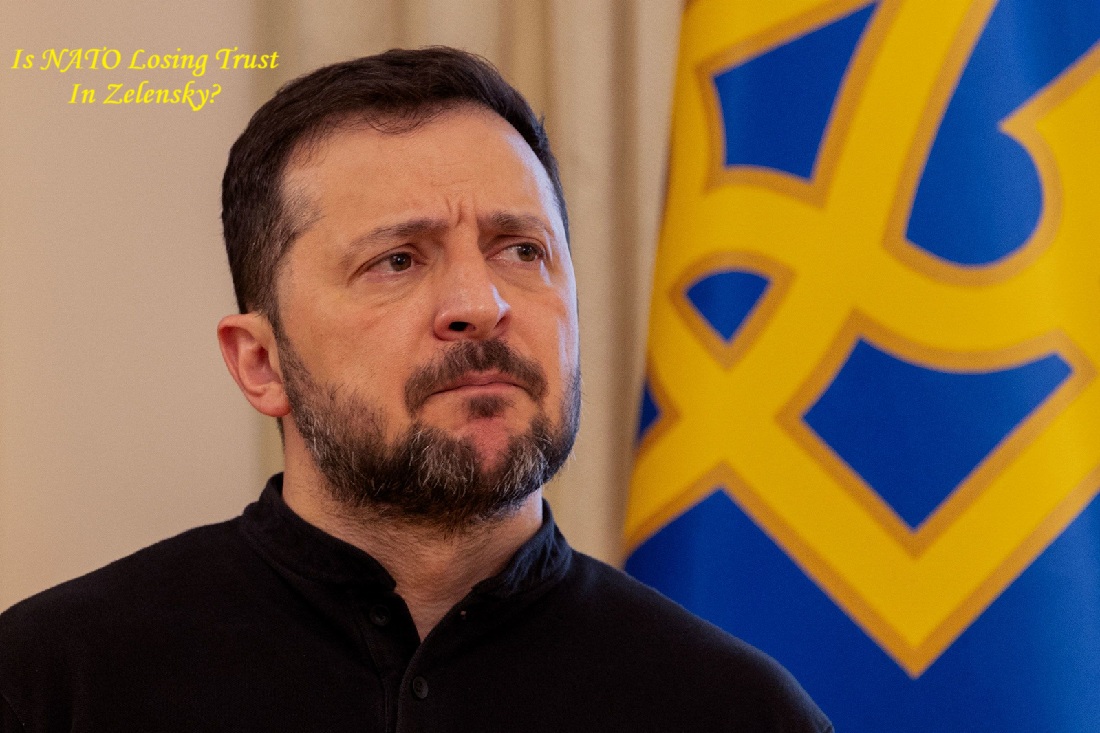Is NATO losing trust in Zelensky? As Ukraine struggles on the battlefield and faces corruption allegations, whispers grow of NATO backing a leadership change.
Is NATO planning to change the leadership in Ukraine? NATO -the Western coalition headed by the United States of America, which has armed and financed Ukraine to combat Russia, is now reportedly growing tired of Ukrainian President Vladimir Zelensky, because he has failed to stop the Russian advance and has become an obstacle in peace negotiations with Moscow and continues to demand money and arms from the West without any hint of accountability, according to claims made by the Russian foreign intelligence service SVR.
There is also the growing sense of reports and commentary emerging from Western capitals. According to the SVR, NATO members are working quietly towards a change in Ukraine’s leadership. One turning point came when Zelensky removed his most successful General, Gen. Valerie Zolon Shini in March 2024 and sent him to London as Ukraine’s ambassador. Now one could argue that it’s no surprise is that Russia is saying this – after all Russia is at war with Ukraine and naturally has its own motives for wanting to change Ukraine’s leadership – but the question remains: What if Russia’s assertions were true? Could there be merit to SVR’s claims about a change in leadership in Ukraine?
The SVR says that NATO is mulling ways to facilitate Zelensky’s removal, one of the ways they could apparently do this is by discrediting him ahead of potential elections in Ukraine next fall. SVR claims that Western officials view Zelensky as an obstacle to peace talks with Moscow. Zelensky’s term as President of Ukraine expired last May; however, he has remained in office, refusing to resign during a time of war. Also, presidential polls in Ukraine have been postponed due to the martial law imposed when the war began in 2022.
According to the SVR, Western leaders are looking forward to freeze the war in Ukraine. They allegedly seek to steer both Moscow and Ukraine towards negotiations, but they see Zelensky as an obstacle to achieving this very goal. With reports like these, it seems more likely that NATO is losing trust in Zelensky and reconsidering its options.
The Russian intelligence agency further claims that NATO is allegedly preparing a campaign to undermine Zelensky’s position and this could involve releasing information that supposedly links Zelensky and his administration to the misappropriation of over $1.5 billion, which were designated for military equipment purchases.
The SVR has also alleged that Zelensky was implicated in the illegal sale of Western-supplied weapons to armed groups in Africa. Well, the question remains: how much of all this is true? It is difficult to comment on that at this point of time, especially during war time. Now the SVR also claims that with Trump’s return to power in the US, there is increasing uncertainty regarding the future of Western support for Ukraine which may have accelerated efforts to replace Zelensky.
However, neither NATO nor Ukrainian officials have publicly addressed the SVR’s claims so far. But do Russia’s claims have any validity? Again, it’s hard to comment on that at this point of time.
Corruption and Western Frustration
Moreover, Ukraine’s history with corruption only complicates matters further. In fact, corruption has been cited as the major reason why Ukraine is still not a part of NATO or the European Union. Western leaders have repeatedly emphasized the need for Ukraine to address corruption as a top priority. Since the conflict began scandals related to military spending have emerged – including instances of price gouging on food supplies for armed forces, overpriced winter gear and also unfulfilled contracts for mortar shells.
This corruption has led to questions about the integrity as well as efficiency of Ukraine’s governance, and NATO member states have also expressed frustration with Zelensky’s demands and the never-ending war. For instance, Poland – once Ukraine’s staunch ally – has expressed frustration with Zelensky’s lack of gratitude. The Polish defense minister talked about the general sense of fatigue from the war. Speaking to Financial Times, he said, “Of course, there is fatigue in Polish society and it is understandable especially when people here see young Ukrainian men driving the latest models of cars or staying in five-star hotels. On the one hand, I understand Zelensky because it is his role to always demand greater assistance. But I think he and Ukraine must also remember that when others were only sending helmets, we sent tanks.”
That response was an apparent reference to a recent point of friction between the two countries over Warsaw’s refusal to supply Kyiv with its remaining stock on of MiG29 jets. Warsaw had said that they needed them for their own security; Warsaw’s refusal to send more aircraft showed the cracks in the NATO alliance. But it’s not just Poland – in the US, a recent opinion poll has shown that support for arming Ukraine had declined amongst Americans as well. Also, in Germany, the EU’s most powerful member lawmakers and military officials say that there is nothing left to give to Ukraine from the German Armed Forces.
Diverging International Perspectives and the Call for Elections
Meanwhile, Russia has repeatedly said that it is open to talks but has pointed out that it is unable to do so because of the ban on talks that was announced by Zelensky in 2022. Russian President Vladimir Putin had also stated that freezing the conflict is unacceptable and that Ukraine’s accession to NATO cannot be allowed. For Russia, the demands to end the war are very clear, and now Russia has also joined the US in urging Ukraine to hold elections. Trump’s envoy Keith Kellogg stated that elections during war time are essential for democracy; however, Ukraine fears that holding elections at this point of time, could weaken national unity and pave way for Russian influence.
Also, the US Secretary of State Marco Rubio has highlighted, the war is not just about fighting back against Russia but recognizing the current challenges and the ongoing human suffering. Rubio has stated that the goal should not be a prolonged stalemate on the battlefield.
While some within the Western bloc continue to support Zelensky’s leadership during the war, others have argued that his grip on power may not be good for Ukraine. On top of that, Zelensky’s popularity is also declining with more and more Ukrainians expressing concern over his centralization of power, which may undermine the country’s democracy.
Zelensky says that holding elections would require a change to the Electoral Code – prohibiting votes during martial law, ensuring fair voting procedure for those serving in combat, and reaching the millions of Ukrainians displaced during the war. It raises this very question: Who will fund that? Will the US or EU fund election in Ukraine? That seems highly unlikely, knowing what we know now; Would it come as a surprise then NATO has grown weary of Zelensky? The conversation continues to stir debates around whether NATO is losing trust in Zelensky.
The US Aid No Longer Free for Ukraine
As Ukraine continues to face mounting losses on the battlefield, the US president Donald Trump has hinted that US military aid comes at a cost – and that cost is access to Ukraine’s vast deposits of rare earth elements.
It is worth to note that with an estimated value exceeding $26 trillion, minerals from Ukraine are crucial for the global supply chain.
Ukrainian forces are falling back, outgunned and outnumbered – they are losing ground in the east as Russian troops push forward. The battle is turning against them, supply lines are under fire, fresh reinforcements are scarce and Moscow is seizing the advantage.
The war nears a breaking point, but now a new demand emerges from Kyiv’s biggest backer: Washington.
US president Donald Trump proposes a bargain – American military support in exchange for access to Ukraine’s vast mineral wealth. He said: “We’re telling Ukraine they have very valuable rare earth. We want what we put up to go in terms of a guarantee. We want a guarantee. We want — we’re handing them money hand over fist. We’re giving them equipment; Europe is not keeping up with us they (the Euros) should equalize. Look, we have an ocean in between. They don’t. It [a war on Russia] is more important for them than it is for us, but they’re way below us in terms of money [expended on the war]. They should be paying at least equal–they should really be paying much more than us, but let’s say equal to us. They have spent billions and billions of dollars below [what we have]. So, we’re looking to do a deal with Ukraine where they’re going to secure what we’re giving them with their rare earth and other things.”
Ukraine’s Mineral Wealth and External Demands
With a treasure trove of critical raw material worth over $26 trillion, Ukraine is one of the world’s most valuable suppliers of metals essential for defense technology and green energy. To put that in perspective, the US economy is worth $30 trillion. Ukraine has rich reserves of lithium, titanium, pilum, gallium and uranium deposits. The global market for these minerals has doubled in 5 years surpassing $320 billion and is expected to double again soon.
If the US secures control over Ukraine’s resources, it could reduce its reliance on China – a dominant force in rare earth supplies – but at what cost to Ukraine?
Meanwhile, president Vladimir Zelensky is seeking clarity on US aid and making a shocking claim that Ukraine received only $75 billion of the $177 billion US-approved aid.
Zelenskky says: “I as a president of a waring country tell you we received more than $75 billion, that is $100 billion out of these $177 billion or even $200 billion as some people estimate, we never received and this is important because we talk about specific things because we did not get it with money, we got it in weapons.”
Conclusion
As the Frontline crumbles, Zelensky faces a harsh reality: Will Ukraine agree to Trump’s terms – risking economic sovereignty – or refuse and see military aid diminish? With Russian forces advancing and time running out, Ukraine is being pushed into a dangerous corner. Amid it all, one question continues to echo louder — Is NATO losing trust in Zelensky?

